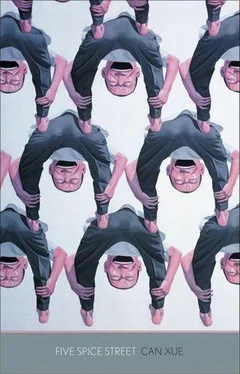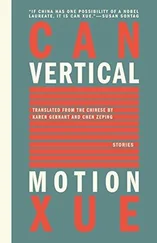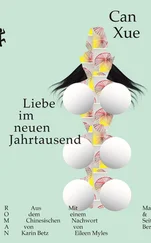Can Xue - Five Spice Street
Здесь есть возможность читать онлайн «Can Xue - Five Spice Street» весь текст электронной книги совершенно бесплатно (целиком полную версию без сокращений). В некоторых случаях можно слушать аудио, скачать через торрент в формате fb2 и присутствует краткое содержание. Год выпуска: 2009, Издательство: Yale University Press, Жанр: Современная проза, на английском языке. Описание произведения, (предисловие) а так же отзывы посетителей доступны на портале библиотеки ЛибКат.
- Название:Five Spice Street
- Автор:
- Издательство:Yale University Press
- Жанр:
- Год:2009
- ISBN:нет данных
- Рейтинг книги:5 / 5. Голосов: 1
-
Избранное:Добавить в избранное
- Отзывы:
-
Ваша оценка:
- 100
- 1
- 2
- 3
- 4
- 5
Five Spice Street: краткое содержание, описание и аннотация
Предлагаем к чтению аннотацию, описание, краткое содержание или предисловие (зависит от того, что написал сам автор книги «Five Spice Street»). Если вы не нашли необходимую информацию о книге — напишите в комментариях, мы постараемся отыскать её.
they
Five Spice Street
Five Spice Street — читать онлайн бесплатно полную книгу (весь текст) целиком
Ниже представлен текст книги, разбитый по страницам. Система сохранения места последней прочитанной страницы, позволяет с удобством читать онлайн бесплатно книгу «Five Spice Street», без необходимости каждый раз заново искать на чём Вы остановились. Поставьте закладку, и сможете в любой момент перейти на страницу, на которой закончили чтение.
Интервал:
Закладка:
How did Madam X answer? She told the writer (looking left and right, afraid someone would overhear) that her greatest wish was that the people would ‘‘forget’’ her. This would give her the greatest happiness. She had been observed for so many years that she had come to understand that she was different from others. She wasn’t a person but only the embodiment of desire. Because it could never be actualized, this kind of desire could only upset people. The greatest thing would be if everyone could do what Dr. A suggested and see her only as a symbol and with the passage of time forget her. The inconsistency lay precisely in that no one saw her as a symbol; they all had to see her as a person. They also kept making demands and giving her trouble. All at once, they wanted her to turn somersaults; all at once, they wanted her to be photographed (at this point, she expressed again her great indignation at the photographers for failing to pay her as they had promised); now, they also wanted to entice her to get married (she threw a glance at the writer). All of this made her station very nebulous: she was neither an ordinary person nor an abstract symbol; rather, she was swinging between the two. It was like being kicked back and forth like a ball. It seemed that she was destined to this fate: she couldn’t become one of the ordinary people, nor could she become a symbol. It was damnable. However, he shouldn’t imagine that she had no way to go on living. She still had ‘‘layers of armor-plate protection,’’ so up to now had lived ‘‘better than people expected.’’ It was not necessary for anyone to worry about her marriage. She ‘‘had her own plan’’ (she gave the writer a sweet smile that made the writer’s heart skip a beat).
She said, “Yesterday, I had a fascinating date. You’ll never find out this kind of thing. So don’t waste your time.’’ The writer felt enlightened, and asked if this was P.
‘‘Or perhaps O. Anyhow, there’ll always be someone.’’
‘‘How can you be so fickle?’’ The writer was indignant. “You must know that it was only recently that we hypothesized there was a P. We haven’t seen even his shadow. Now, great, there’s also O. You’re a representative: how can you get involved in such disgraceful things?’’
The writer urged Madam X to focus on P because her status wasn’t the same now. In everything, she now had to consider the effect on the people. How could the writer explain this to the people? Madam X couldn’t take the writer’s complaints and agreed to change the person she had met to P, but her attention wandered as she talked, and she also called him O or D, while the writer tirelessly insisted it was P.
‘‘What business is it of yours?’’ she demanded, staring above the writer’s head with great disgust, as though dead fish hung over him.
The writer said that it had nothing to do with him, but had to do with the destiny of all of the people on Five Spice Street. P was the idol hypothesized by all the people. How could she smash it or replace him? This wouldn’t do. Even if she wanted to replace him, she had to give the people time to get used to it. She couldn’t do it in one fell swoop, nor could she do this every day, replacing lovers as often as she pleased. People would get the wrong idea: they’d believe in nothing. People who have lost their faith are like trees chopped down at the roots. It wasn’t right. It was dangerous. P had already become part of the crowd’s social life: as soon as he was mentioned, everyone grew excited. They talked endlessly about him, hypothesizing and making plans. Even old men (for example, Old Meng) were not exceptions. His appearance kindled everyone’s youthful spirit, so P was a good, objective entity independent of Madam X. Therefore, she should treat this entity reasonably and not look upon him as her private property, because he wasn’t. He was the creation of all the people.
After the writer enumerated everything significant about P, he also told Madam X that she had become everyone’s friend and soon she would have a lot of visitors. The writer estimated that almost the whole street (including the elites and even the geniuses) yearned to bare their hearts to her and establish even closer relationships. It was only past misunderstandings and estrangements that prevented them for the moment from coming to her home: they were all waiting for her to declare herself. As a first gesture toward the people, should she post an announcement or publish something in the blackboard newspaper? If she felt this didn’t suit her, she could just open her doors and windows, place a vase on the windowsill, and sit there to show her inner transformation. Everyone would understand. She should know how magnanimous the people are. Hadn’t she done a lot of ‘‘extremely improper’’ things, and had we acted too harshly? Seeing her with brand-new eyes, we not only overlooked her improprieties but connected them with the wave of the future! It was only because she’d taken the initiative to cast Q off that we hypothesized that there was a P. If she was still trysting with Q in the granary, if they were still ‘‘deeply attached,’’ perhaps everyone would be ‘‘profoundly enlightened.’’ She should realize that Five Spice Street was a rare, sweet place. The road was so wide! The architecture so ancient and solemn! Only in this miraculous place could her existence be so respected; only here could she freely and lightheartedly develop herself.
The writer finished speaking and noticed that Madam X was no longer in the house. He found her in the snack shop. He was about to repeat his suggestion that she open the door and put a vase on the windowsill when she suddenly complained: ‘‘Haven’t they paid me what they owe me yet?’’
‘‘Who?’’
‘‘The fucking photographers! Who else? I won’t be tricked again! Huh!’’ With that, she turned deaf and mute again. The writer could not revive her.
Soon after, another big event occurred in Madam X’s life. The wall of her house that faced the street seemed on the brink of collapse from years of wind and rain. Madam X thought carefully for a morning and decided to apply to the community for repairs. She wasn’t hopeful. It also contradicted her desire that the people ‘‘forget’’ her. Why then did she apply? Here, we will inform the reader that certain of Madam X’s principles were not invariable; they might change several times a day. She thought of her application as if ‘‘watching a play,’’ as if the wall on the brink of collapse didn’t belong to her but to someone else. ‘‘Let’s see how they deal with it,’’ she gloated. Then she didn’t think of it again. From that day on, she just locked the front door and went around to the back door to go in and out.
However, the community was excited by her application. Everyone recognized that this was the first time Madam X had taken the initiative to establish a relationship with the people! She had become one of us! Could a fish survive without water? Could a melon leave the vine? In the end, Madam X couldn’t exist without the community. We had been absolutely correct in electing her our representative. If she had established a direct relationship with us earlier (for example, had she made an application the day she moved here), maybe she would have become the representative much earlier! Her strange principles had prevented her from doing so, and she had kept the people at arm’s length. Actually, we had always considered her one of us, and all our former suspicions were dispelled when she submitted her application. Now people feel close to her, think of her as a family member, and warmly call her ‘‘our Madam X.’’ As for the wall, the people thought it a pretext, an excuse to get close. The main thing was that her application was unprecedented! Dr. A urged the writer to make a big-character poster that very night: ‘‘Especially big news that is creating a stir on the whole street.’’
Читать дальшеИнтервал:
Закладка:
Похожие книги на «Five Spice Street»
Представляем Вашему вниманию похожие книги на «Five Spice Street» списком для выбора. Мы отобрали схожую по названию и смыслу литературу в надежде предоставить читателям больше вариантов отыскать новые, интересные, ещё непрочитанные произведения.
Обсуждение, отзывы о книге «Five Spice Street» и просто собственные мнения читателей. Оставьте ваши комментарии, напишите, что Вы думаете о произведении, его смысле или главных героях. Укажите что конкретно понравилось, а что нет, и почему Вы так считаете.












